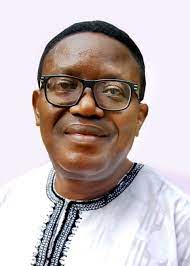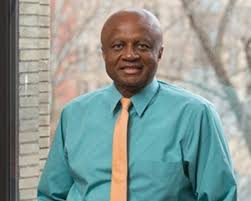
By Owei Lakemfa
In my visit to the United States from May 22, 2024 to deliver a Lecture, I was determined to meet a man I had never met. I wrote him from Nigeria and we agreed to meet. At the crowded Port Authority train station in New York, we easily picked out ourselves; his image was etched in my memory. We went into a locked embrace.
I first heard about him 46 years ago. I was a student at the Methodist Boys High School, Lagos and a frantic military regime was threatening students at all levels with dire consequences if we dared joined the on-going nationwide protests led by the National Union of Nigeria Students, NUNS.

To show it was deadly serious, the regime had not only shot dead four undergraduates and an unspecified number of persons across the country, it had also in Zaria, killed 13-year-old Lasisi Abubakar, a Primary Six pupil and, 15-year-old Alhaji Shehu. An unidentified secondary school student had also been killed in Ile-Ife, home of the University of Ife, now renamed, Obafemi Awolowo University.
To us, the protesters were heroes. When in the new session that year, I was admitted into Ife, the first student rally I attended, was a demand that the four expelled leaders of those protests must be re-admitted to complete their studies. One of them was Offiong Offiong Aqua, the 22-year-old pioneer President of the University of Calabar, UNICAL, Students Union.
Back in 1978, the country was like a conquered territory of the military top brass. It had three years earlier, decimated its own ranks. It destroyed the public service and judiciary through arbitrarily mass sack. It had also proscribed the central labour organisation for three years and banned for life, eleven leading labour leaders from trade unionism.
Finally, it took on the education sector by imposing fees, increasing feeding costs by 200 per cent and generally, tried to transform education into a commercial product only the affluent could afford.
The regime had befriended student leaders and so, did not expect any protest either from the students nor from a populace it assumed it had conquered.
But the NUNS rejected the moves and embarked on “Operation Consultation” to “Operation Consolidation”. When these would not make the regime rethink its ruinous policies, NUNS met at the University of Ilorin to review its strategies and weigh its options. This was where Aqua came firmly into the scene. He had seconded a motion for collective action, including lecture boycotts and protests moved by the teenage President of Ife, Tunde Babatunde. But no firm decision could be taken. So it was decided to hold a further meeting. Aqua on behalf of UNICAL offered to hold the meeting, but the NUNS leadership was uncomfortable because he was the most outspoken advocate of the need to move to “Operation Confrontation”. More so, when he was already advocating regime change.
An angry Aqua announced that if the NUNS leadership did not want UNICAL to host the crucial meeting, it would pull out of the national union. Frantic consultations ensued, and the follow up vote gave UNICAL the hosting right.
Aqua arrived from Ilorin in the night and immediately convened the UNICAL parliament which voted for protest. The parliamentary approval meant the student executive was empowered to utilize the union funds to actualise its decision. Back in 1978, that was no small money: one dollar was equivalent to 66 Kobo. So, the UNICAL Student Union budget was the equivalent of $2.5 million!
The Aqua leadership hit the road and took to the air campaigning across the country for lecture boycott. When the NUNS met in UNICAL, it endorsed “Operation Confrontation.” That led to the historic April-May, 1978 protests.
The protests spread like wildfire across the then 13 universities, other tertiary institutions, on to the streets.
After brutally suppressing the protests, the regime went on a revenge mission. It identified the four core student leaders and expelled them from school. Segun Okeowo, the NUNS President, was detained for 43 days. Ekpein Appah, leader of the University of Benin Students Union and Buka Mbaya, President, Ahmadu Bello University Students Union, were detained at the Kirikiri Prison, Lagos. Aqua was detained in Calabar for months.
If Aqua’s aunt, Elizabeth Weyen Henshaw, later Professor, had her way, he would not have attended university in Nigeria. She taught at the New York University, NYU, and had secured admission for him, but his father preferred he schooled in Nigeria. Now, with his expulsion, she secured a new admission for him. He applied for a passport, but was refused on the basis that he was banned from not only processing a passport, but also leaving the country. Similarly, he was barred from attending the World Youth Festival in Cuba.
At this point some socialists led by veteran journalist, Dapo Fatogun, and labour leader, Wahab Goodluck, secured a scholarship for him to study in Moscow and also got a flight ticket.
When preparatory to civil rule, electioneering began, Aqua’s mentor, the journalist, Bassey Ekpo Bassey, gave him a note to the Secretary General of the Nigerian Peoples Party, NPP, Paul Unongo, who was able to secure a passport for him. But he was still barred from travelling.
In Lagos, he met a sympathetic Army Lieutenant who asked if he had a visa. When he answered in the affirmative, the officer asked him to get a ticket that can fly him from Cotonou, Benin Republic. Luckily, he had the Lagos-Moscow ticket that was part of his scholarship. He got it changed to Cotonou-Moscow.
The young officer in uniform then drove Aqua in a military vehicle through the border into Benin Republic. But they got information that security men were waiting in Cotonou to pick up Aqua, so they drove on to Lome, Togo, where luckily, an Aeroflot Airline accepted his ticket.
After settling down in Moscow, he applied to the Nigerian Embassy that he had lost his passport. This was to cover up the fact that his passport had not been stamped out of Nigeria. He came home on holidays in 1980, but his name was still on the no-fly list. So his passport was seized, he was under house arrest for 14 weeks. Since he had presidential pardon, Presidential Political Adviser, Dr Chuba Okadigbo, intervened and got his passport returned. Aqua returned to his studies in Moscow where he obtained medical post-graduate medical training in Maxillary Surgery.
As my wife and I sat with him in his NYU office where he is a Clinical Professor, I could not but reflect that Aqua who was twice offered admission into the same university, but could not take them up, has for over a decade been producing doctors in the same university.
_._,_._,_




GIPHY App Key not set. Please check settings